
News (826)
Pioneering programme helps households climb out, and stay out, of extreme poverty
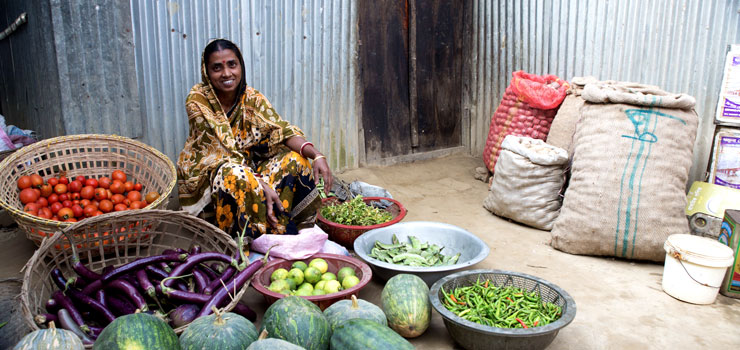
A programme pioneered by development organisation BRAC, which aims to help households escape extreme poverty by supporting women to set up their own small businesses, not only works but its benefits increase in the long term, according to an evaluation(1) led by researchers at the International Growth Centre (IGC), based at the London School of Economics and Political Science (LSE). The research findings in published today in London.
BRAC’s ‘Targeting the Ultra-Poor’ programme has benefitted 1.6 million households in Bangladesh by helping the very poorest women shift out of low paid and insecure work, such as casual agricultural work or domestic service, into running their own small businesses. It does this by providing them with large scale livestock assets alongside two years of complementary training.
Researchers found that, four years after taking part in the programme, the women increase their annual earnings by 37 per cent.
Seven years after the start of the programme, the increase in the women’s spending on non-durable goods, such as food, is 2.5 times larger than after four years. At the start of the programme, only 10 per cent of beneficiaries have access to renting or owning land – seven years later, this figure is nearly 40 per cent.
Four years after the programme is implemented, there is an eight percentage point decline in the number of households living on less than $1.25 per day(2). Households who benefit from the programme continue to climb out of poverty at a steady rate seven years later(3).
Oriana Bandiera, Professor of Economics at LSE and one of the authors of the study, said: “Our study is significant because it is one of the most extensive and long term evaluations of these types of anti-poverty livelihood programmes. This allows us to see that that the transformative effects of BRAC’s approach are sustainable and therefore life changing for the ultra-poor households who take part. When you trust the poor with assets and train them with the necessary skills, they do better and better, year after year.”
BRAC founder Sir Fazle Hasan Abed said, “It is our aim to meet the first sustainable development goal and end extreme poverty by 2030. Through this programme and the results of our ongoing research, we know this approach works to move the ultra-poor into sustainable livelihoods and help them increase their incomes. We are working this way in Pakistan and South Sudan as well as Bangladesh. Other organisations are also replicating this model, which is encouraging. I believe ultra-poor graduation approaches can make a major contribution to ending extreme poverty.”
The research also highlights a new finding about the nature of poverty – the poorest are neither unwilling nor unfit to engage in the same jobs as more prosperous women in their communities, but face barriers which prevent them from doing so. Before having access to BRAC’s programme, it was predominantly higher earning women who could access more stable and productive work such as rearing livestock. This work generates on average more than double the hourly earnings of the irregular and poorly paid jobs that the ‘ultra-poor’ are limited to such as casual agricultural work or domestic service.
On average, for every £1 invested in the programme there was a return of £5.40.The women who participate shift their working hours from casual wage labour towards rearing livestock and, in doing so, increase the number of hours they work and their earnings.
The researchers compared the employment opportunities and choices of the women who participated in the BRAC programme with women across different wealth classes. They tracked over 21,000 households over seven years, including 6,700 ultra-poor households and 15,100 from other wealth classes.
Aspects of BRAC’s ‘Targeting the Ultra-Poor’ programme have been replicated by other organisations across Africa, Asia and Latin America and have had very positive results in increasing consumption for the extreme poor(4).
BRAC has a strategic partnership with UK Aid and Australia in Bangladesh, providing large scale funding to BRAC’s ‘Ultra-Poor’ programme for many years. International Development Minister Desmond Swayne said: “The UK is proud of our partnership with BRAC and the Australian Government in Bangladesh. Over the last 5 years UK support has so far enabled BRAC to lift 580,000 people out of extreme poverty and delivered health, education, water and sanitation to the poorest and most marginalised. Earlier this year I saw first-hand the difference this work is making to people across Bangladesh. BRAC’s programme targeting the ‘ultra-poor’ is of great significance to development worldwide and the global goal of ending extreme poverty by 2030.”
The Ministry of Industries (MoI), Global Alliance for Improved Nutrition (GAIN), BRAC held a series of events on Nutrition and the Sustainable Development Goals (SDGs)
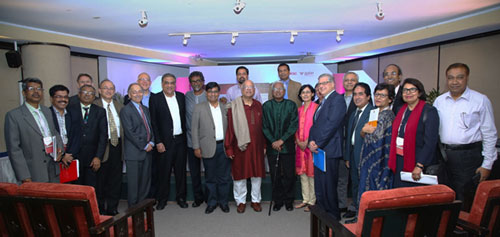
Global Alliance for Improved Nutrition (GAIN) and BRAC held a series of events to discuss Nutrition and the Sustainable Development Goals (SDGs): New Approaches to Partnership. The activities concluded today 2nd December with interactive knowledge sharing and a field visit at Palash Upazila (Sub-District), Narshingdi (District) in which the GAIN Global Board Members took part. GAIN’s discussion on SDGs started with a dialogue with government officials on 29 November where the Honourable Minister of Commerce Mr Tofail Ahmed M.P. was present as the Chief Guest.
The Honourable Minister of Commerce Mr. Tofail Ahmed M.P. attended the event as Chief Guest and Professor Dr. Gowher Rizvi, International Affairs Advisor to the honourable Prime Minister of the People’s Republic of Bangladesh was the special guest. Panel discussion was facilitated by Executive Director of GAIN, Marc Van Ameringen and discussants included, Mr. Md. Mosharraf Hossain Bhuiyan ndc, Secretary Ministry of Industries and Mr. Syed Monjurul Islam, Secretary Ministry of Health and Family Welfare, Laurent Umans, First Secretary, Food Security from the Netherland Embassy and Heather McBride, Deputy Director, Planning and Lead Analyst from the Canadian High Commission. The event was well attended by representatives from the Ministry of Finance, Ministry of Food, ERD the Social Development Fund, USAID, UNICEF and the European Union.
On 30 November the discussion focused on nutrition and the Sustainable Development Goals (SDGs) which was jointly organised by BRAC and GAIN. Dr. Kaosar Afsana, Director of BRAC Health, Nutrition and Population Programme (HNPP), Executive Director of GAIN, Marc Van Ameringen and Dr. Tahmeed Ahmed, Director, Nutrition and Clinical Services Division, icddr,b facilitated the event. Dr. Muhammed Musa, Executive Director of BRAC and Vinita Bali, Chair of the GAIN Board gave opening remarks. The Honourable Finance Minister Mr Abul Maal Abdul Muhith M.P. attended the event as Chief Guest and Mr Mosharraf Hossain Bhuiyan, Secretary of Ministry of Industry was the Special Guest. The founder and chairperson of BRAC, Sir Fazle Hasan Abed KCMG attended as a Special Guest and the event was attended by officials of different ministries of Government of Bangladesh, Board of Directors of GAIN Development, Civil Society and private sector partners and research organisations. Panel discussants included Dr. Khairul Hassan, Deputy Chief (Health), Ministry of Health & Family Welfare, Dr. Md. Quamrul Islam, Director, IPHN and Line Director, NNS, Mr. Shawn Baker Director of Nutrition, Bill and Malinda Gates Foundation (BMGF), Dr. Stanley Zlotkin Chief, Global Child Health, Hospital for Sick Children, Canada, Mr. Laurent Umans, First Secretary, Food Security, The Royal Netherlands Embassy, Ms. Christa Räder Country Representative WFP, Dr. Md. Ataur Rahman Health & Nutrition Adviser Canadian High Commission, Dr. Jiban Krishna Biswas, Director General, Bangladesh Rice Research Institute (BRRI), Ministry of Agriculture , Mr. Michael Anderson, Chief Executive Officer, Children’s Investment Fund Foundation, Mr. Omar Dary Senior Nutrition Adviser, USAID, Ms. Anuradha Narayan Chief, Nutrition Section, UNICEF and Ms. Abi Masefield NAS, Consultant, European Union.
Honourable Finance Minister Mr Muhith M.P. said, “Bangladesh has broken the shackles of extreme poverty through combined efforts of Government, NGOs, academia and private sector”. He also stressed on the importance of research based initiatives to tackle hindrances like poverty and malnutrition.
Sir Fazle emphasised in frugal innovations in bringing nutritious food at the door steps of people. He shared his experience on how BRAC addressed the condition of iodine deficiency in Bangladesh with a holistic approach including setting up salt mills to produce iodised salt. Sir Abed said, “To scale up nutrition intervention, a multi sectorial approach is necessary”. He also added that “the incidence of malnutrition is widespread not because of lack of food but because of lack of knowledge. Therefore, primary and secondary education curriculum may consider including relevant content on nutrition”. He also urged Ministry of Health and Family Welfare to step forward and persuade ministry of education to make this happen.
Mr Mosharraf Bhuyian, Secretary, Ministry of Industries, said, “The government of Bangladesh is committed to support the cause of combating micronutrient deficiency in Bangladesh. The Ministry of Industries has taken the lead in the Universal Salt Iodisation programme, with the goal of alleviating iodine deficiency by 2030. Mr Bhuyian highlighted the recent success of mandatory fortification of edible oil with Vitamin A as is a good example of a cost effective, scalable intervention.
Mr Jay Naidoo, the Chair of the Partnership Council of GAIN concluded the event with a vote of thanks.
Young coders develop app solutions on social problems
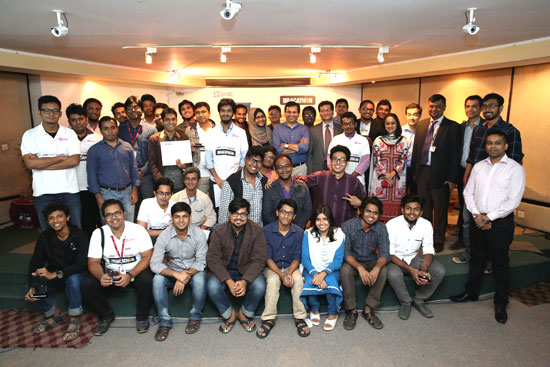
“BRACathon”- BRAC’s first ever hackathon attracted more than 120 budding app developers and students to compete for prize and developing useful mobile applications to contribute in social innovation. The 36 hour long BRACathon took place from 4-5 December 2015 in BRAC University. 27 teams including IT students and tech start-ups participated.
The theme of BRACathon was technology for social good. The participating teams were given 11 problems including TB prevention, micro-learning, microfinance data access, crowdsourcing information for city roads improvement, bKash user interface etc. Students from BRAC University, NSU, IUB, BUET, Ahsanullah University and technology start-ups including EMPOWER, Miyaki participated in this competition.
After the marathon 36 hours of coding, each team gave a presentation on their mobile app solution, in front of a jury board of 12 members. The jury board members included senior management from BRAC, representatives from DFID and Australian High Commission, faculties from BUET and BRAC University.
Based on the quality of the proposal, impact, innovation, functionality and presentation seven teams were announced as winners on 6th December 2015. Each of these seven teams will be given up to USD 3000 in order to help them to finalise their apps. BRAC IT specialists will provide further assistance and guidance to these young developers to scale up. In addition to this, BRAC will also help them implement these apps to enhance its operational efficiency.
The winners of the competition are Reboot, Miaki, AMITIE ,mPower Rangers, TRIUMPH IT, BUET Gamechangers and Technolive.
The award giving ceremony started with a panel discussion. Mr Anir Chowdhury, Policy advisor of prime minister’s office, Paul Whittingham, Deputy Country Representative, DFID Bangladesh were present among the other sector specialists. The discussion was moderated by BRAC and BRAC International’s senior director Asif Saleh.
Appreciating BRAC’s initiative at the prize giving ceremony, Mr Anir Chowdhury said, “Digital Bangladesh allows one person to do a lot of innovation. Digitalisation gives empowerment if used correctly. Digital Bangladesh provides the opportunity of young leadership.”
Deputy country representative of DFID Paul Whittingham, “We are committed to bring more young people in this field, so the voices are heard across. The best way to ensure that is through technology.”
Fifth year in a row

The Financial Reporting (FiRe) award was held in Kampala on 19 November 2015. At the event, BRAC Uganda was awarded the certificate of recognition for outstanding achievement in the general sub-category and named the winner in the non-governmental organisation category.
The award was received by BRAC Uganda’s country representative, country head of accounts and accounts manager. This is the fifth consecutive year when BRAC Uganda has won an award at an event organised by Institute of Certified Public Accountants of Uganda.
BRAC marks FI2020 week with nationwide dialogue on microfinance

According to the World Bank an estimated 2 billion working-age-adults do not have an account at a financial institution.
To build global momentum around how to address the remaining gaps in financial inclusion, the Financial Inclusion 2020 campaign celebrated FI2020 week from 2-6 November.
A worldwide event, FI2020 week involved over 25 partners who each organised conversations on how to make significant steps to advance financial inclusion. The range of participants included banks, policy makers, NGOs, microfinance institutions, investors, and financial capability experts.
The only partner from Bangladesh, BRAC seized the opportunity by launching a nation-wide dialogue with local government leaders on how microfinance is contributing to alleviating poverty in the country. Across the 64 districts of Bangladesh, deputy commissioners- representatives of local government- were invited to visit BRAC’s microfinance operations. They gained better appreciation of how microfinance empowers the poor, especially women, and how the provision of financial services serve as cross-cutting tools that complement the government's work towards the sustainable development goals.
The nation-wide engagement with local government is hoped to nurture the supportive environment that government has enabled for microfinance institutions to function. During his visit, the deputy commissioner of Chittagong Mesbah Uddin said, “Customised financial services reach out to those who remain unbanked. Besides providing economic opportunities, BRAC’s microfinance addresses gender inequality, legal and human rights and financial education.”
During FI2020 week, BRAC also organised a debate among its staff on how microfinance fits into BRAC’s broader model of development. The main purpose of the discussion was to share insights into how financial services help the poor to cope with poverty, and ways in which BRAC could continue to improve its microfinance model in its mission to alleviate poverty.
Executive director of BRAC, Dr Muhammad Musa, who moderated the debate, observed, “As an organisation, when we work towards eradicating extreme poverty and helping individuals realise their potential, we need precise tools like microfinance to offer a more complete package of services to our clients. In a changing world we need to adjust, re-adjust, sharpen and strengthen microfinance so that it impacts a wider group of people.”
BRAC is a leading provider of financial services for the poor in seven countries including Bangladesh, Tanzania, Liberia, Uganda, Sierra Leone, Myanmar and Pakistan. Its ‘credit-plus’ approach addresses the specific needs of the various target populations such as rural women, adolescents, landless poor, marginal farmers, migrant workers, urban poor and small entrepreneurs. As it expands its microfinance programme BRAC’s strategy of financial inclusion serves to complement its other programmes such as health and education, while keeping client protection at its centre. Access to financial services is a core element of BRAC’s holistic approach to development, helping households to save, consume, and work with convenience and dignity.
Workshop on accessing green climate fund held
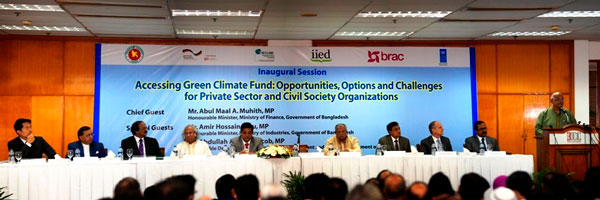
The Senior Secretary of Economic Relations Division (ERD) of Ministry of Finance as the National Designated Authority (NDA) of Bangladesh to the Green Climate Fund (GCF) organised a daylong workshop titled ‘Accessing Green Climate Fund: Opportunities , Options and Challenges for Private Sector and Civil Society Organizations’ on November 8, 2015 in Dhaka.
The workshop was a part of NDA’s efforts to prepare Bangladesh to get access to the GCF. It aimed to introduce the GCF to Bangladesh private sector and CSOs with a special focus on private sector facility (PSF) window of GCF and facilitate direct access for private sector/CSOs. This workshop also shared and gathered relevant knowledge as well as foster an open dialogue with the private sector and CSOs about their role in combating the impacts of climate change and how they can get engaged in climate change adaptation and mitigation.
In general there are two different ways to access the GCF. One is the 'Indirect Access' which is through the Multilateral Implementing Entity (MIE) that includes multilateral development banks and the United Nations agencies accredited by GCF. The other is the 'Direct Access' which is through National Implementing Entity (NIE) that includes any national institution accredited by the GCF. Accreditation will be done by the CGF board based on stringent eligibility criteria. No organisation can access the GCF without accreditation. For NIE accreditation they will require certification from NDA.
Present as the chief guest at inauguration, finance minister Mr. Abul Maal A. Muhith MP, said, “Bangladesh is one of the worst victims of climate change. So getting access to the GCF is very important and government, private sector and civil society have to work together to achieve this.”
Lack of institutional capacity in climate change finance governance is the greatest challenge in developing countries like Bangladesh to get accreditation of NIE to ensure direct access to GCF. To overcome this challenge, through inclusive consultation, intensive self-assessment process, expert's opinion and a two-daylong consultation workshop (earlier this year), NDA Secretariat, ERD nominated 6 (six) national institutions as the most potential candidates to apply for GCF's accreditation as NIEs. However, that was for public sector only. Based on that experience, NDA aims to engage with Private Sector and Civil Society Organisations sector (CSOs) who have a big role to play in combating climate change challenges. This workshop is the beginning to that direction.
Mr. Amir Hossain Amu MP, Honourable Minister, Ministry of Industries in his speech said, “Our government is not allowing to set up any industries that are harmful to environment and public health. Although the recurring natural disasters are happening due to excessive carbon emission by the developed countries, the victim countries are not getting enough fund promises.”
“Strategies are essential for the private sector and CSOs to combat the challenges of climate change in Bangladesh. In that context this workshop aims to bring awareness amongst private sector and CSOs so that they can explore their role in combating climate change challenges and can access the GCF to engage in adaptation and mitigation actions” said Mr. Abdullah Al Islam Jacob MP, Honourable Deputy Minister, Ministry of Environment and Forests in his speech.
The inaugural session was chaired by Mr. Mohammad Mejbahuddin, Senior Secretary of ERD and NDA of Bangladesh to the GCF. It was followed by two technical sessions targeted separately to CSOs and Private sector. The technical sessions oriented the participants about the opportunities and challenges and steps of getting access to the fund. Dr. Essam Yassin Mohammad from Sustainable Markets Group, IIED, UK, Advisor of GIZ’s Finance and Climate Policy Mr. Lars Andersen and Professor of North South University Dr. Mizan R. Khan took the technical session for the private sector. The technical session for CSOs was conducted by professor Emeritus of BRAC University Dr Ainun Nishat, Executive Director of BRAC Dr Muhammad Musa and programme advisor of GEF Small Grants programme, UNDP regional office Mr Tenence Hay-Edie.
Representatives from private sector, business associations, civil society organisations, corporate bodies, environment experts, development organisations of the country joined the workshop.
ERD organised the workshop in partnership with Deutsche Gesell Schaftfür Internationale Zusammenarbeit (GIZ) GmbH, International Institute of Environment and Development (IIED), International Centre for Climate Change and Development (ICCCAD), BRAC and United Nations Development Programme (UNDP).
A fight against hygiene-related diseases
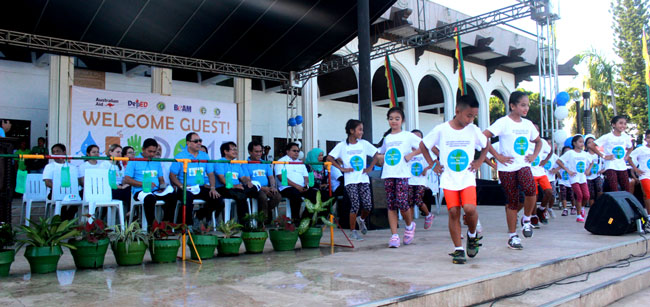
Global Handwashing Day was celebrated in the Autonomous Region in Muslim Mindanao (ARMM) on 26 October 2015 led by the regional department of education and department of health. With the commitment to improve the performance of children in schools, the DepEd-ARMM decided to celebrate the event annually with a regular carry out of the Essential Health Care Program (EHCP) activities including bi-annual deworming. This is the fourth year for the event to be celebrated in this region.
BRAC Philippines along with other government and non-government organizations celebrated the event in Cotabato City. To date, more than half of the 845 learning centers of the alternative delivery model (ADM) project have integrated the EHCP in their classroom sessions in partnership with GIZ Philippines. The learning facilitators conduct daily group tooth brushing and hand washing with soap in BRAC Learning Centers as part of their daily classroom activities. EHCP aims to show children the importance of personal hygiene.
Dr John Magno, DepEd-ARMM secretary noted that ‘handwashing with soap is a low-cost but effective intervention to prevent hygiene-related illnesses among school children in the region.’
Sir Fazle Hasan Abed has been honoured as the 2015 World Food Prize Laureate
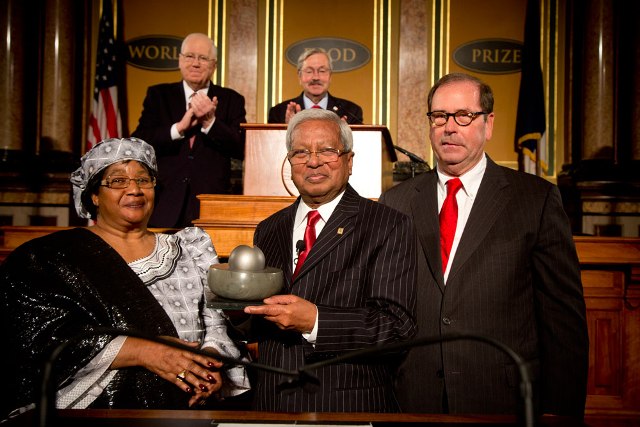
Founder of BRAC received this prestigious prize for giving nearly 150 million people worldwide the opportunity for enhanced food security and a pathway out of poverty.
BRAC founder and chairperson Sir Fazle Hasan Abed has been honoured as the 2015 World Food Prize Laureate, on 16 October 2015 at 06:30am (Bangladesh time) at a ceremony held at the Iowa State Capitol Building in Des Moines, Iowa, USA. This highly prestigious prize was conferred to him for his outstanding contribution to enhancing the world's production and distribution of food to those most in need.
The chairman of The World Food Prize John Ruan III handed over the award to Sir Fazle at the event which was the centrepiece of a three-day international symposium. This prize which often referred as the Nobel Prize for food and agriculture also includes USD 250,000.
Receiving the award Sir Fazle said, “I must acknowledge that the award does not belong to me alone, it is the recognition of BRAC’s work over the last 43 years in providing pathways out of poverty for millions of people in Bangladesh and other countries in Africa and Asia.”
He also said “The real heroes in our story are the poor themselves and, in particular, women struggling with poverty who overcome enormous challenges each day of their lives. Throughout our work across the world, we have learnt that countries and culture vary; but realities, struggles, aspirations and dreams of poor and marginalised people are remarkably similar. In order to solve the multidimensional problems of poverty, we have to think big, in terms of millions not thousands and holistically. In the coming decades we must refine methods of delivery at scale, placing solutions at the hands of poor people themselves and track progress. Only by putting the poor specially women in charge of their own lives and destinies will poverty and deprivation can be removed from the face of the earth.”
Guests and dignitaries present at the ceremony included US secretary of agriculture Tom Vilsack, president of World Food Prize Foundation Ambassador Kenneth Quinn, president of Iowa senate Honourable Pam Jochum, speaker of Iowa house Honourable Linda Upmeyer. Former president of republic of Malawi and founder of the Joyce Banda Foundation Mrs Joyce Banda was present as distinguished special guest of honour. The ceremony was presided by the governor of Iowa Terry Branstad.
BRAC is widely credited as a major contributor to Bangladesh's achievement in halving poverty and hunger levels since 1990, in line with the UN's Millennium Development Goals, through its sustained efforts in the fields of poverty and hunger eradication and food security. By focusing on scalable solutions, BRAC’s food programmes have turned into sustainable social enterprises that provide inputs and access to stable markets for the rural poor. From its inception till today,
BRAC has helped nearly 150 million people worldwide with the opportunity for enhanced food security.
Earlier this year, Ambassador Kenneth M. Quinn, announced Sir Fazle as this year’s winner at a ceremony at the State Department in Washington, DC.
BRAC's agriculture and food security programmes are part of a larger set of poverty eradication interventions working in 11 countries, empowering the poor, especially women and girls, using tools such as microfinance, education, health care, legal services, community empowerment, social enterprises, and a full-fledged university, BRAC University, in Dhaka.
Watch Sir Fazle's speech at the ceremony
Chevron Bangladesh Launches Enterprise Development Pilot with BRAC
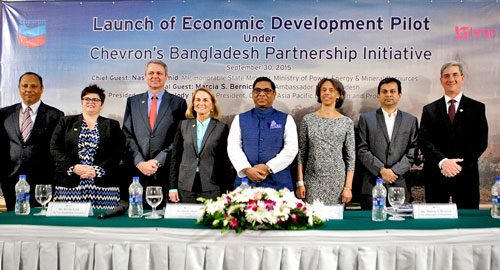
Chevron Bangladesh today announced the launch of an 18-month pilot for an enterprise development programme. The initiative, to be implemented by BRAC, will be for the communities of the Bibiyana, Jalalabad and Moulavi Bazar gas field locations where Chevron operates. It is part of the five-year Bangladesh Partnership Initiative (BPI), a $10M commitment that was formally launched in September 2014 to support economic development. The ceremonial event held at a local hotel was graced by the presence of Energy Adviser to the Prime Minister of Bangladesh, Dr. Tawfiq-e-Elahi Chowdhury, Bir Bikram, and the United States Ambassador to Bangladesh, Marcia Stephens Bloom Bernicat, who attended as Chief and Special Guests respectively. Also present were President of Chevron Asia Pacific Exploration and Production, Melody Meyer; Senior Director of Strategy, Communications and Empowerment at BRAC, Asif Saleh; Managing Director of Chevron Asia South Ltd Brad Middleton, and Chevron Bangladesh President, Kevin Lyon.
It is anticipated that the programme will reach approximately 20,000 beneficiaries, and up to 1,500 enterprises will be established during its lifespan.
Mr. Lyon said in his remarks, “We feel privileged that BRAC, the world’s largest NGO, is partnering with us on this important journey. We’re confident that their tremendous knowledge and vast experience will help us significantly improve the socioeconomic standing of our communities. BPI is a five-year programme, but I hope that its impacts will be sufficiently far-reaching to continue beyond its lifespan and beyond Chevron’s intervention. We want to be a part of the success of our communities, and I’m excited that the launch of this pilot will be a key step in that direction.”
Mr. Saleh said, “The project focuses on inclusion, sustainability and self-dependence. BRAC’s strength is working in the rural Bangladesh focusing on holistic development and the partnership with Chevron will have a bigger impact in generating livelihoods for the target group. We hope our joint work can give people the tools to climb out of poverty and lead them towards prosperity.”
Chevron Bangladesh entities are subsidiaries of Chevron Corporation, one of the world's leading integrated energy companies. It produces natural gas from the three fields of Bibiyana, Jalalabad and Moulavi Bazar in North-Eastern Bangladesh. In areas where we operate, we invest in activities and programmes that focus primarily on economic development, education and health care, collectively reaching nearly 37,000 people. We work with our communities across our operations, building long-term partnerships that foster social and economic development.
BRAC WASH : learning from WASH experiences in Bangladesh

The BRAC WASH programme began in 2006 and has provided more than 37 million people in Bangladesh with hygienic sanitation and more than two million with access to safe water.
This report documents the proceedings of a learning workshop that brought together donors, government, and national and international NGOs to examine the outcomes of the BRAC WASH programme second phase and emerging challenges.
The first part of the report starts with a review of the programme’s achievements and main challenges, with a special focus on the innovation and learning partnership between BRAC and IRC and what the sector should adopt from BRAC WASH. This is followed by responses from BRAC WASH staff to questions from the floor about issues including financing, sustainability and data sharing. In the next section there are short reflections from the programme’s donors including the Embassy of the Netherlands, Bill and Melinda Gates Foundation and Splash, as well as the Bangladesh government, IRC, NGO Dustha Shasthya Kendra (DSK) and others.
Part two of the report documents discussions on three new areas of work that BRAC intends to focus on: sustainable integration of WASH in other BRAC programmes, WASH in urban areas and water security in coastal areas.
Download the full article here.
Join the world’s biggest family




